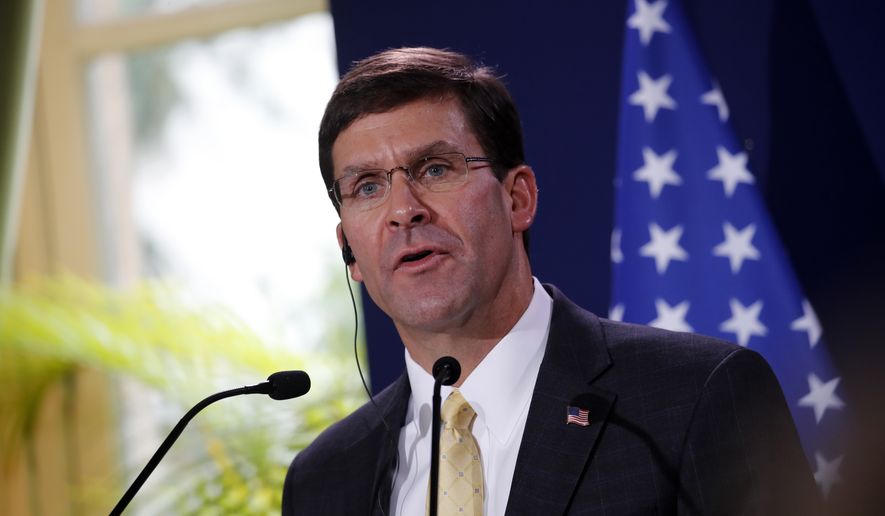Defense Secretary Mark T. Esper emphasized the Pentagon’s role in protecting the U.S. electoral process from ongoing attacks as the 2020 presidential contest approaches.
“Moving forward, I consider election security an enduring mission for the Department of Defense,” Mr. Esper said Thursday during an event in Maryland, multiple outlets reported. “Our adversaries will continue to target our democratic processes. This is a reality of the world we live in today. Guarding against these threats requires constant vigilance.
“Our adversaries are attempting to harm our economic prosperity and to undermine our democratic institutions. Influence operations against the American public are now possible at a scope and scale never before imagined,” Mr. Esper said. “The Department of Defense has an important role in defending the American people from this misinformation, particularly as it pertains to preserving the integrity of our democratic elections.”
Mr. Esper, a former Raytheon executive, previously served as secretary of the Army prior to being appointed by President Trump in June to succeed Jim Mattis as the administration’s top defense official.
Speaking at the second annual National Cybersecurity Summit in National Harbor, Mr. Esper reportedly said that several changes made after the 2016 U.S. presidential election was attacked have put the Pentagon in a better position to handle any efforts to interfere in next year’s race.
Mr. Esper cited three factors that he credited with successfully defending the 2018 midterm elections, the Fifth Domain cybersecurity news site reported: greater cooperation among federal agencies, advancements in the Pentagon’s cyber capabilities and a classified directive issued last year by Mr. Trump — the National Security Presidential Memorandum 13, or NSPM 13 – that authorized the military to take a more offensive stance toward countering cyber threats than before.
“By defending forward, we are able to see and understand malicious cyber behavior, allowing us to publicly expose that activity and its culprits. It’s also posturing us to take action against these threats, at their source, before they reach the homeland,” Mr. Esper said, Fifth Domain reported.
“The bottom line is we are now prepared to deliver the actions expected from the department in a timely, collaborative and risk-informed manner,” he added, according to the site.
American intelligence agencies previously concluded that 2016 presidential race was targeted by Russian state-sponsored hackers and professional internet “trolls” who waged cyberattacks against elements of the U.S. voting infrastructure and weaponized social media platforms to spread political misinformation and propaganda, respectively. Moscow has denied responsibility.
The Pentagon previously relied on NSPM 13 to prevent Russian trolls from getting online during the 2018 midterms, The Washington Post previously reported.
“The passage of NSPM-13 gave us the authorities needed to more fully employ our cyber capabilities in an offensive manner,” Mr. Esper said at the summit Thursday, Fifth Domain reported. “This policy reflects a shared understanding of the need to maximize the effectiveness of the department’s cyber warriors.”
• Andrew Blake can be reached at ablake@washingtontimes.com.




Please read our comment policy before commenting.